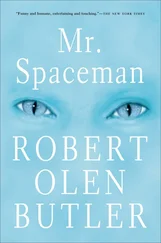He says, “He gave me the love of books expecting me to come to the same conclusions from them that he did.”
Her face puckers in puzzlement. “You seemed to.”
She’s right.
“I often bit my tongue,” Robert says.
She smiles at him, half smiles. “An act of love.”
Well, the act never won his. He catches himself before this comes out of his mouth. She’s tried the same tactic all her life long.
Her eyes are fixed on Robert’s but restlessly so.
“He loved all of us,” she says.
And he understands. If she can convince Robert of William’s love for him, then she might believe that the man loved her as well.
Because she doesn’t believe it.
Of course she doesn’t.
And it abruptly occurs to him: He hasn’t told her what he knows about the old man’s secret trysts.
Her priests would nail me for a sin of omission. A big one. Sure it was for his privacy. It was his place to tell her. It was between them. It had been going on for years when I found out. She would have stopped him. She would have nagged him back home if she knew it was something that didn’t threaten her so profoundly she preferred the lie. But still. He wasn’t worth keeping it from her. He was never worth it. Mea culpa.
“Mom,” he says. “I’m so sorry. I should have told you sooner. But it wasn’t so long ago I found out. All those afternoons, for all those years, that he drove off on his own in New Orleans: It wasn’t a woman. It was guys like those you met tonight. It was Dad and his army buddies doing beignets and chicory coffee.”
Peggy’s face goes blank. Then she blinks, and for a few moments more she shows nothing. And a few more.
Robert doesn’t understand.
So he says, “He loved you.”
She blinks again. Then she begins to cry.
Oh shit : Robert should have told her long ago. Or he should have figured out a better way to tell her now.
He lifts his hand to touch her shoulder, perhaps pull her to him.
She catches his hand in hers, lifts it, and squeezes it.
“Are you sure?” she says.
“I’m sure.”
“It’s time for me to cry a while,” she says. “Thanks for this.”
“I’m really sorry,” he says. “I should have told you at once.”
Peggy struggles to manage her voice, hold off the tears. “You were caught between us. I totally understand, sweetheart. You loved your father too.”
She looks around, lets go of Robert’s hand, sits down on an overstuffed chair beneath the torchiere. “I’ll be in soon,” she says.
Robert stands over her for a moment more, but she has lowered her face to weep.
He turns and moves along the hallway.
He pauses between the two sets of doors.
He thinks to head outside, to get away from all of this.
He faces the porte cochere exit. His hands go to the push bar.
Beneath the tree Bob’s eyes are open again. The whining has been fading. It’s almost gone. The numbers are gone. He’s done these countings before. He wishes he could decide when they happen, could make them happen. The whine, the numbers are better than the voice and the words. Hello, Private Weber. Let’s talk.
Robert’s hand is on the push bar.
But he knows this is futile. There will be no escape tonight.
He looks back down the hallway to his mother, her torso, in profile, bent forward, her head bowed, her hands clasped, resting on her knees.
He turns around, crosses to the doors into the visitation room, pushes through.
Darla appears before him.
“Hey,” she says. She must have been standing nearby, expecting him.
“Hey.”
Darla glances over his shoulder, sees that Peggy isn’t appearing. “Is she okay?”
“She’s crying alone for a while,” Robert says.
“That’s good.”
“I hope.”
“I saw you two go out.”
“There isn’t much privacy at a thing like this.”
“It’s what a wake’s for. So you’re not alone.”
“What have you been doing?”
“Serving food.”
“Is it going over?”
“The Irish stew is a big hit.”
“That’ll please her.”
“So it will.”
Robert looks away, into the room, whose numbers seem to have increased since he stepped out. Not that he sees anyone in particular. They are all blurring together now.
Darla says, “Can I make a suggestion?”
“Sure.”
“I never saw my own dad after he died. Did I ever tell you that?”
He looks at her. “No.”
“Well. I didn’t. It was a closed casket. I needed to look at him. It’s a good way to get things straight in your head so he won’t hang around in there.”
Robert tries to take this in. He’s not sure. He stalls by quibbling.
“Still waiting for the suggestion,” he says.
“You weren’t with him at the casket for very long,” she says. “Just make sure you did enough tonight.”
Robert looks off in the direction of the far wall. In the middle of the room, a clump of assisted living visitors with plates of Irish stew blocks his view of the casket beyond. But he’s thinking Darla may be right.
She says, “It’s not about good guys. I had as much trouble with my dad as you did with yours. More.”
“Okay,” he says. “You’re right.”
Robert and Darla would both agree: This is one of the paradigms of the two of them at their intellectual best with each other. A difference. A discussion. Patience over a semantic quibble. One sees the other’s point. And concurs. Sealed with a moment of contented silence.
That moment ends, but before they part she says, “Does she need me, do you think?”
“Mom?”
“Yes.”
“Not right now. I think she needs to be alone.”
“I’ll go dip some stew.”
“I think you’re starting to like it.”
“Please,” she says.
She begins to turn away.
Robert puts his hand on her arm. “Hey.”
She looks back at him.
“Thanks,” he says.
She nods.
He heads off toward the wall with the casket.
She moves in the other direction, toward the buffet room. But she puts only a few steps of separation between her and the back door of the visitation room before her department chair intercepts her and hugs her as if the dead father were Darla’s own. Darla figures the warmth is mostly about department politics, which means a conversation is imminent. She gives up the hope of hiding immediately behind the stew.
Robert veers wide around the group of old women in hats and old men in wide ties from Longleaf Village. He keeps his face averted; he’s met a couple of them and this is not a time to chat.
He’s past them now and he looks toward the casket.
A man is standing there, his back to Robert.
Robert does not recognize him.
Just a man. A lanky man wearing a leather jacket, his hands clasped behind him, his pewter-gray hair thick-curled and shaggy at the collar.
Robert stops. He’ll wait till the man moves off.
Robert looks about to see if anyone else is waiting to view the body.
A few steps off to the left is a pretty, pale-skinned woman, her dark hair spilling from beneath a knit cap. He takes her for an art theory student of Darla’s. Perhaps she has a concealed sketchbook, waiting to capture a dead man.
Robert thinks to walk away now.
But he returns his gaze to the man.
He has not moved.
Well, yes. His hands, in their clasp, have begun to twist, have grown fretful.
And now Robert has a thought. This man is not from FSU. Not from assisted living. Not one of Bill’s generation. Wearing leather at a funeral home visitation, he’s not from Peggy’s church. Robert looks at the woman again. Her gaze is fixed on the man. They are here together. And she’s older than he thought at first glance. Robert looks closely at her jaw, looking for his father’s, his own, his brother’s. Looks at her eyes. He’s not recognizing a Quinlan, but he’s never met Linda. This woman’s features could be from Linda’s genes. He follows her eyes back to the casket. The man’s hands cling to each other to quell their restlessness. Robert suspects his own hands were just as restless when he stood there. It’s him.
Читать дальше












